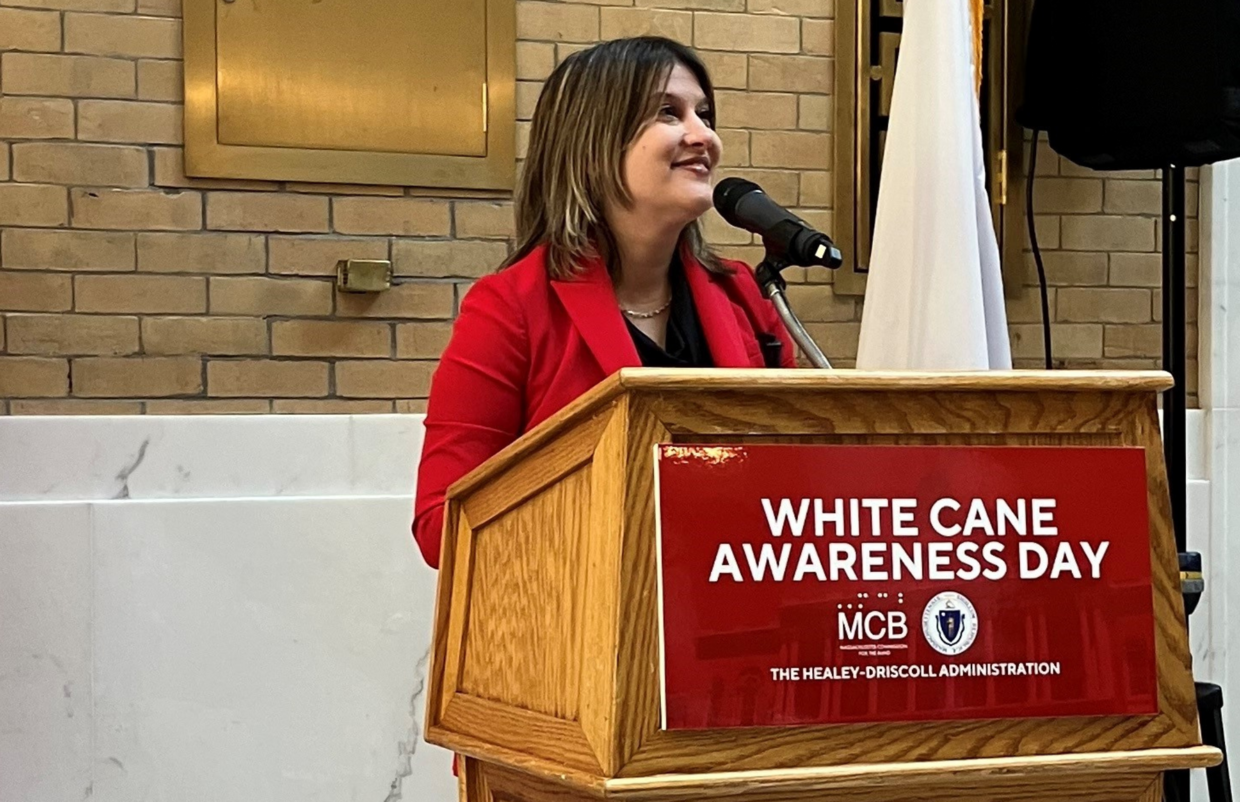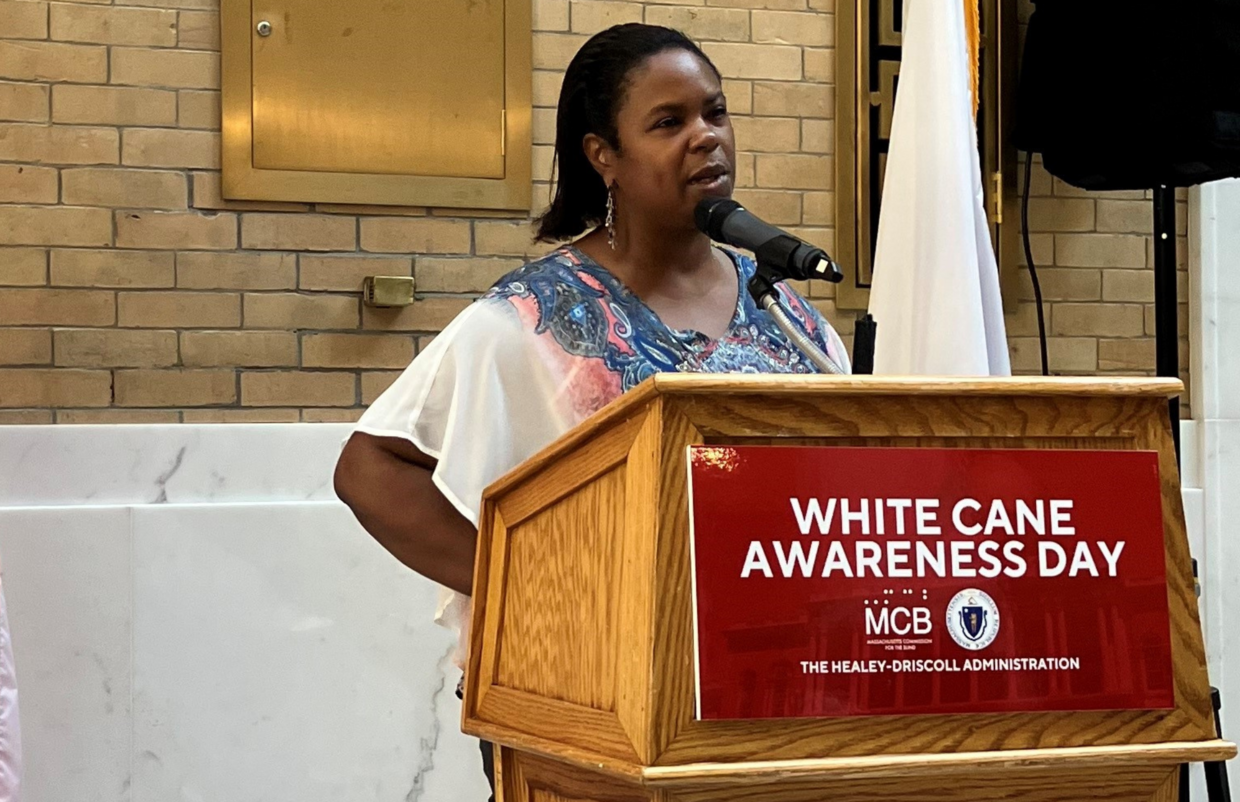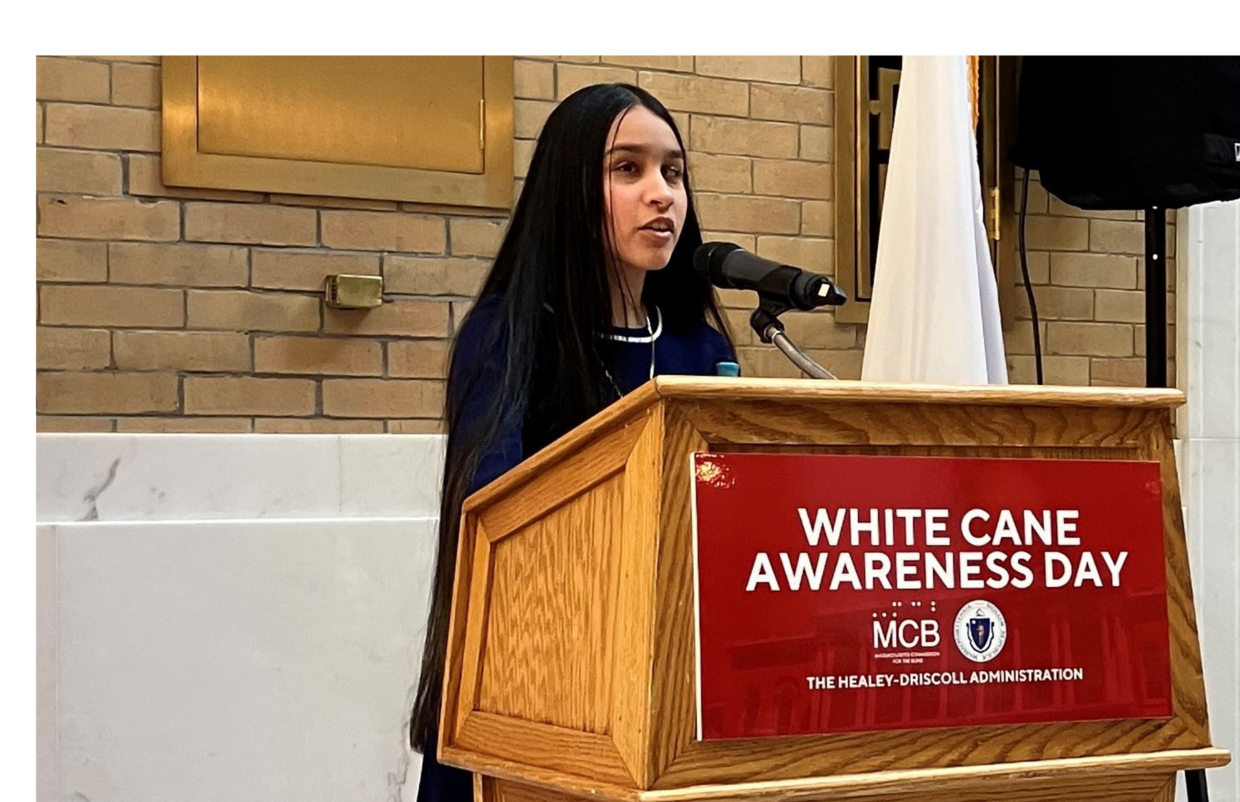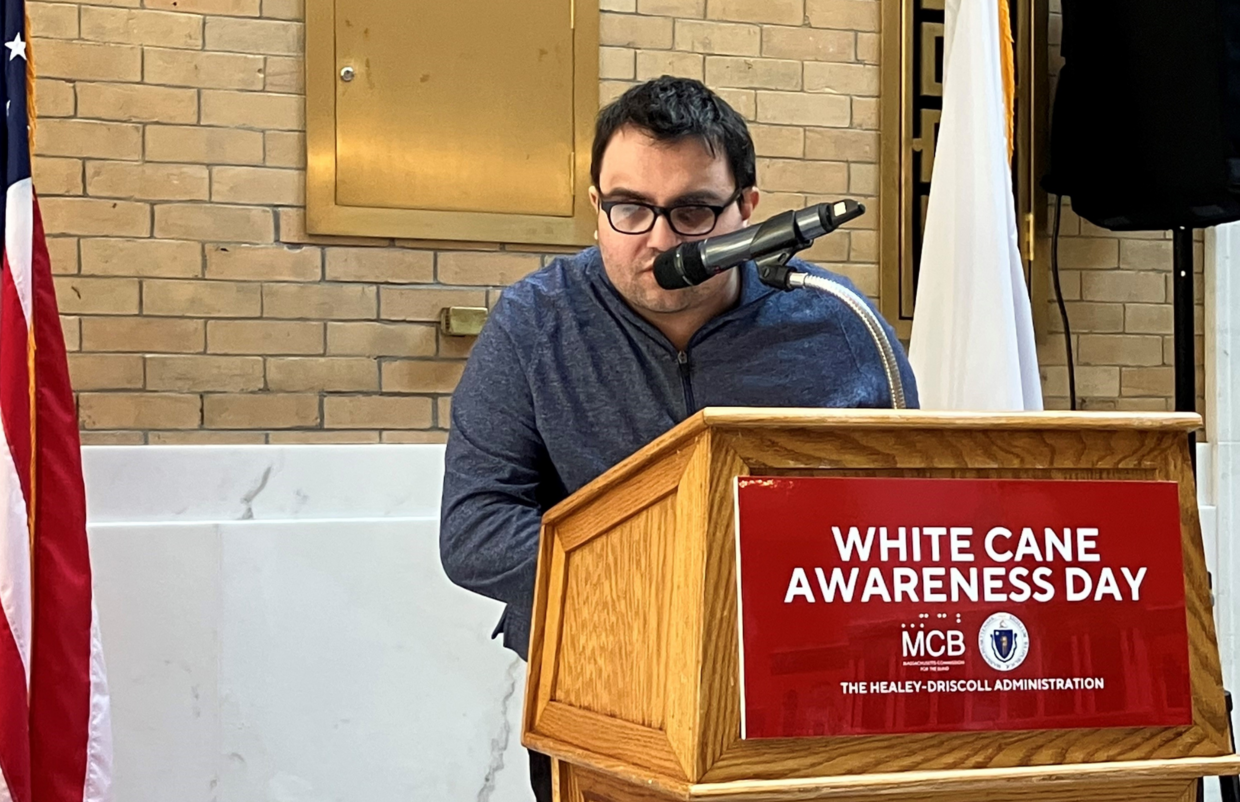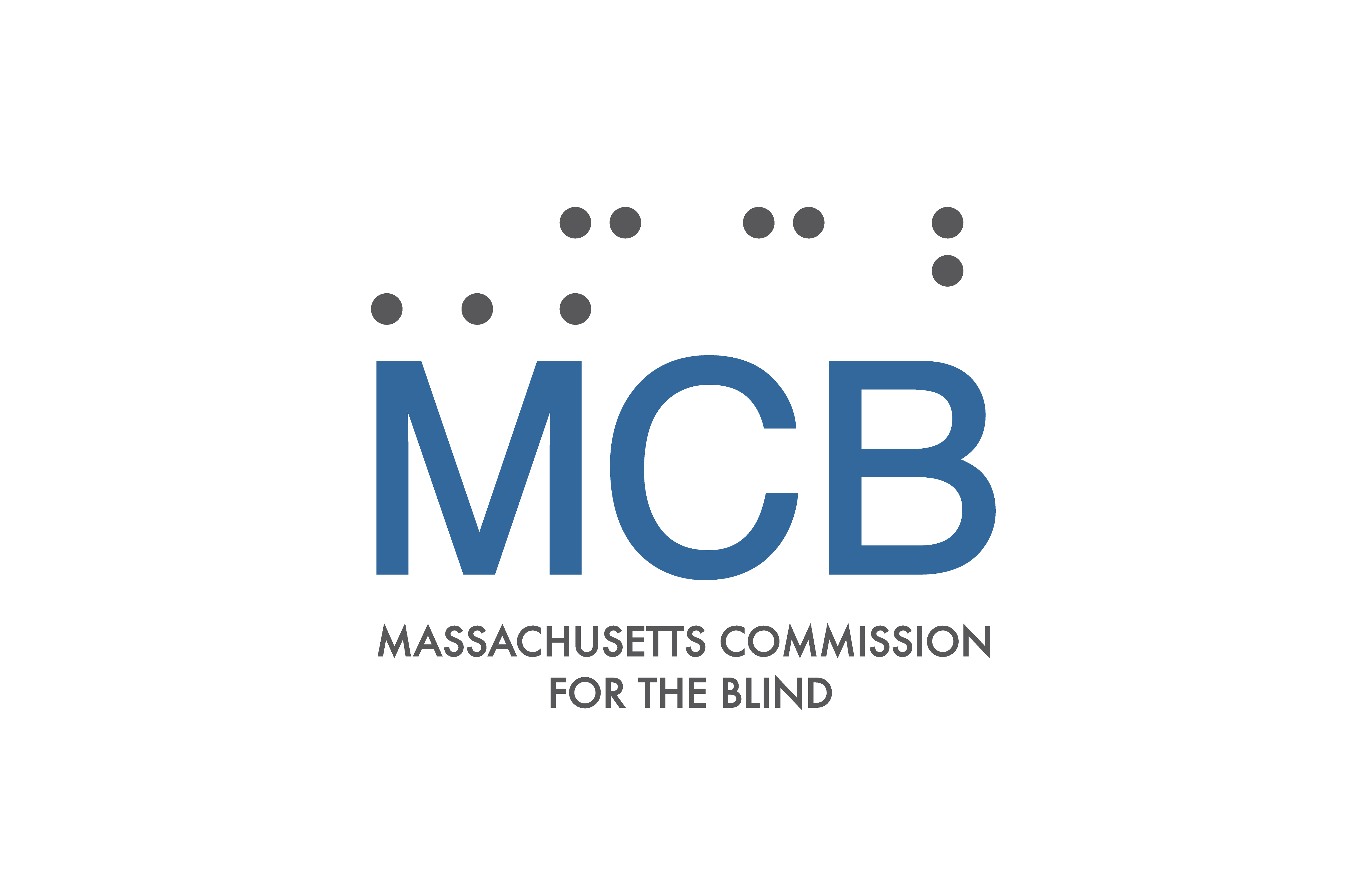- Massachusetts Commission for the Blind
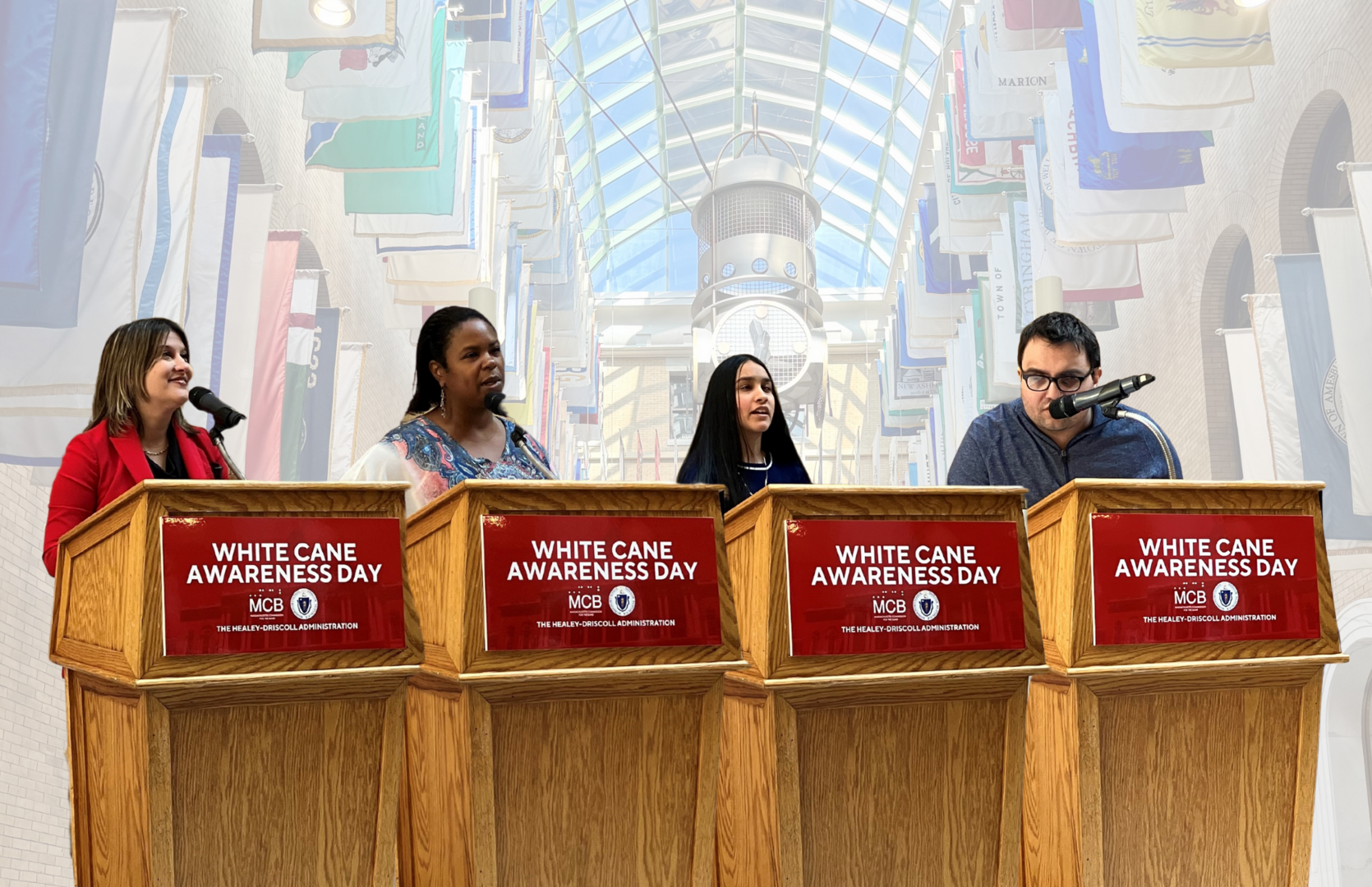
The White Cane Awareness Day Celebration on October 18 at the Massachusetts State House featured four inspiring speakers: Kate Katulak Higgins, Kerlyne Pacombe, Dasha Aries, and Dejan Pajevic. Each shared their unique experiences with the white cane, emphasizing its significance as a symbol of independence, identity, and advocacy for the blind community. Here’s a recap of their speeches. You can listen to their full remarks through the audio recording of the celebration provided by the Talking Information Center.
Kate Katulak Higgins
Kate Katulak Higgins explained her experience with a white cane began during her teenage years when she lost her sight, noting the cane became her "license to explore the world" despite the initial challenges she faced. She shared a memorable story about her first attempt to navigate her neighborhood with the cane, highlighting the funny and often awkward moments of the experience. Without proper training, she was coached by neighborhood children who didn’t fully understand the complexities of navigating as a person who is blind. “I took the express train to blindness,” she quipped, emphasizing the quick adjustment she had to make to her new reality.
Throughout her speech, Kate reflected on societal perceptions surrounding blindness and the use of mobility tools. She encouraged the audience to understand the significance of visibility and confidence, noting that when she embraced her cane, it changed how others perceived her. She said, “Confidence is everything,” highlighting how self-assurance can transform societal attitudes toward disability.
Kate also touched on her dual role as a white cane user and guide dog handler, explaining how both tools contribute to her mobility and independence. She talked about the unique strengths of each, noting having both options allows her to navigate different environments effectively.
Kate emphasized that White Cane Awareness Day is more than just a recognition of mobility tools; it is a celebration of community and the rights of people with disabilities. She called for collective action to foster inclusive environments, stating efforts to support accessibility are vital.
Kerlyne Pacombe
Kerlyne Pacombe shared her journey living with retinitis pigmentosa, highlighting the crucial role of orientation and mobility instructors. She described her evolving relationship with her white cane, which she initially saw as a source of embarrassment and dependence. Over time, however, she learned to embrace it as an essential tool for independence and safety. Reflecting on her early struggles, she recalled often carrying her cane folded, reluctant to acknowledge its importance. “The cane has become part of my identity,” she stated, recognizing it as a symbol of strength rather than limitation.
In her speech, Kerlyne emphasized the broader significance of her cane, representing not just her personal journey but also the visibility and dignity of the entire blind community. She passionately advocated for societal awareness, urging others to use their canes to challenge stereotypes and misconceptions about blindness. “The more canes we have, the more people see us,” she noted, underscoring how visibility fosters understanding.
Kerlyne also expressed pride in her identity as a Haitian American and her commitment to social justice. She explained how her experiences with blindness have shaped her perspective and fueled her advocacy work. By sharing her story, she seeks to challenge societal perceptions of disability and encourage others to embrace their identities. In closing, she reiterated her dedication to representing the blind community, emphasizing that her cane serves not only her independence but also as a powerful symbol for all.
Dasha Aries
Dasha Aries, a 13-year-old student at Parthum Middle School in Lawrence, described her journey with the white cane as bittersweet, highlighting the challenges of concentrating in noisy public environments, where she relies heavily on her sense of hearing. Despite these difficulties, Dasha emphasized the independence her cane has provided. With the support of her Orientation and Mobility instructor, she is actively improving her travel skills.
Having moved to the United States at age three, Dasha recalled the challenges of learning braille and English at the same time. She celebrated her progress by stating, "This goes to show you can do anything no matter how big or small the challenge may be." Now in the 8th grade, she excels in honors classes, particularly in English Language Arts, and is focused on securing a spot in a top high school and eventually attending college.
Outside of school, Dasha enjoys spending time with family and friends, exploring her community, and shopping at the mall. She inspired the audience with her words: "If I can do it, I firmly believe you can too."
In closing, Dasha expressed her gratitude to her parents and teachers for their support.
Dejan Pajevic
Reflecting on his relationship with his white cane, Dejan Pajevic described how his initial reluctance to embrace it transformed into a recognition of its significance for his independence. He stated, “The white cane is important for people who are blind and visually impaired to gain independence.” Dejan emphasized that by actively engaging with his mobility instructor and trusting his cane, he has learned essential skills, such as safely crossing streets and navigating unfamiliar environments. He views the cane as a “door to a new pathway,” enhancing his ability to explore and experience the world independently.
Dejan also addressed the societal stigma surrounding blindness, advocating for greater awareness of the rights and capabilities of people with vision loss. He pointed out how negative perceptions can be reinforced by media representations, noting, “If you have a negative perception of something, you are more likely to stay in that negative perception.” He stressed the need for increased visibility and representation of people with disabilities in all areas of society, including government, to challenge stereotypes and foster understanding.
In conclusion, Dejan shared his dreams for the future, paralleling his aspirations with historical civil rights movements. He expressed a desire for people who are blind to be respected and to have access to the resources necessary for achieving their educational and employment goals. “Don’t let the label of blindness define you,” he urged, encouraging others to embrace their identities and pursue their dreams without fear. He reaffirmed the importance of the white cane as a symbol of pride and agency, reinforcing that individuals with disabilities should not be confined to outdated societal expectations.
